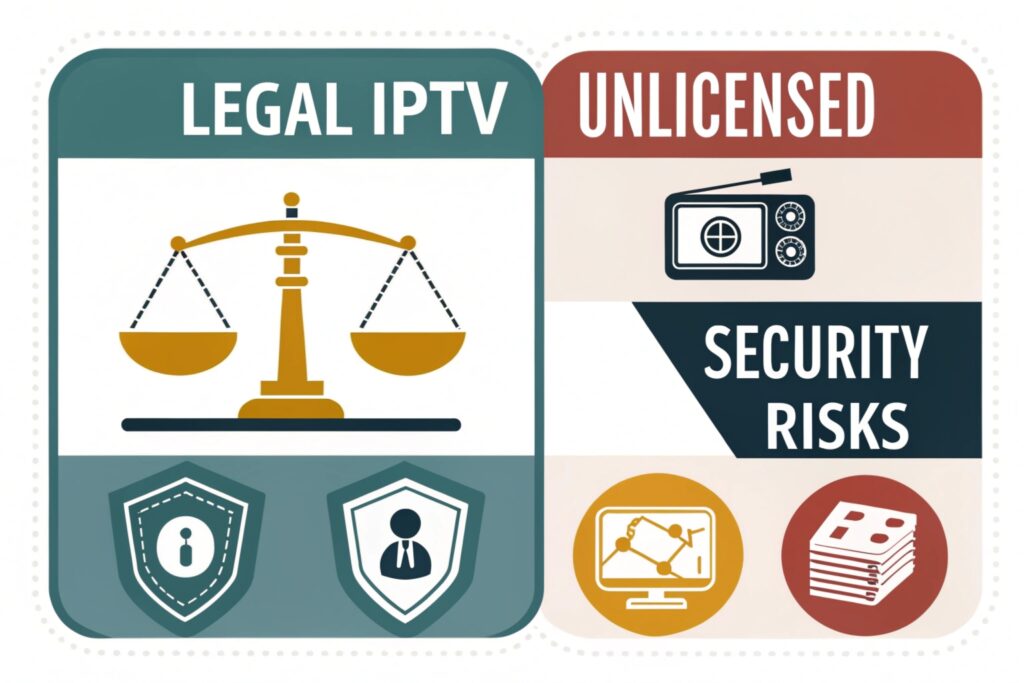IPTV, or Internet Protocol Television, has transformed how people watch TV and movies. With on-demand options, live channels, and compatibility with various devices, IPTV has gained immense popularity. But this convenience brings a question to the forefront: Is IPTV legal? The answer isn’t as straightforward as it seems. In this article, we’ll break down what IPTV is, explore its legal implications in the USA, and provide tips to avoid falling into legal traps. Let’s unravel the facts to help you navigate the world of IPTV with confidence.
What is IPTV?
Definition of IPTV
At its core, IPTV legal stands for Internet Protocol Television—a service that delivers TV shows and movies over the internet instead of traditional broadcasting methods like satellite or cable. Unlike traditional TV, IPTV allows users to watch content on-demand or stream live channels through an internet connection. Whether it’s sports, movies, or news, IPTV makes entertainment accessible and customizable, offering an experience tailored to modern viewers.
IPTV services can be accessed via smart TVs, smartphones, tablets, or dedicated streaming devices. This accessibility is one reasonlegalIPTV has surged in popularity in recent years. But as its usage grows, so do questions about its legal status, which often depends on how the service operates.
How IPTV Works
The technology behind IPTV legal is fascinating yet simple. It uses your internet connection to stream content from servers directly to your device. Think of it as Netflix but with more live TV options. IPTV operates in three formats:
- Live TV streaming, offering real-time channels like traditional broadcasts.
- Video on demand (VOD), allowing users to select shows or movies to watch anytime.
- Time-shifted media, which enables playback of previously aired content.
This flexibility and convenience make legal IPTV appealing. However, its legality can vary based on the service provider and whether proper licenses are in place.
The Legal Status of IPTV in the USA
Is IPTV Legal?
The question, “Is IPTV legal?” doesn’t have a one-size-fits-all answer. IPTV itself is a neutral technology, much like how the internet is. Whether it’s legal or not depends entirely on the service provider’s compliance with copyright laws. In the USA, authorized IPTV services that acquire proper broadcasting rights and licenses are completely legal. These services pay content creators, networks, and studios to stream their material lawfully.
However, illegal IPTV services operate without licenses, which makes their operations a direct violation of copyright laws. These services often offer too-good-to-be-true deals to lure customers, but streaming from such providers can lead to serious legal consequences.
Legal IPTV Services vs. Illegal IPTV Services
It’s essential to distinguish between IPTV legal providers and their shady counterparts. Legal services, like Hulu, YouTube TV, or Sling, offer reliable streaming experiences with transparent subscription plans. They adhere to copyright laws, ensuring their customers are protected.
On the flip side, illegal IPTV services are known for offering unlimited channels, movies, and live sports for ridiculously low prices. These services often rely on pirated streams, which are not only unlawful but also prone to sudden shutdowns, leaving users in the lurch. When in doubt, always verify a provider’s legitimacy before subscribing.

Copyright Laws and IPTV
In the USA, copyright laws serve as the backbone of determining whether IPTV legal services are legal. According to the Copyright Act, distributing or streaming copyrighted material without authorization is a clear violation. Legal IPTV providers pay hefty licensing fees to ensure compliance, while illegal ones sidestep this entirely, putting both themselves and their users at risk.
Risks of Using Illegal IPTV
Legal Consequences for Consumers
If you’re tempted to use illegal IPTV, think again. Streaming pirated content is considered copyright infringement in the USA, and while enforcement primarily targets providers, consumers aren’t entirely off the hook. Users of illegal IPTV services risk facing penalties, including fines or legal notices, especially if they knowingly stream copyrighted content.
Security and Privacy Risks
Beyond legal troubles, illegal IPTV services pose significant security risks. Many of these platforms lack proper encryption, making them a breeding ground for malware and hacking attempts. Personal data, like credit card details, can be compromised, leaving users vulnerable to cybercrime. Legitimate IPTV services, by contrast, offer secure transactions and trusted networks.
Financial Implications
Illegal IPTV services may seem like a steal, but they often come with hidden costs. Frequent service interruptions, poor streaming quality, and the potential for complete shutdowns make these platforms unreliable. Additionally, if caught, users may face steep fines that far outweigh any short-term savings. Investing in a legal IPTV subscription is a safer and more cost-effective choice.
How to Identify Legal IPTV Services
Licensing and Certification
To determine if an IPTV legal service is legal, start by checking for licensing and certifications. Legal IPTV providers are transparent about their rights to distribute content. They have agreements with networks, studios, and copyright holders to stream their shows and movies. Well-known services like Hulu, YouTube TV, and Amazon Prime Video prominently display their licensing details, ensuring users can trust their offerings. Always confirm whether the provider has obtained the necessary permissions to broadcast the channels they offer.
Red Flags to Watch Out For
When evaluating an IPTV legal service, there are certain red flags you should never ignore. Unbelievably low subscription fees, vague or missing business details, and a lack of customer support often indicate an illegal operation. Additionally, illegal providers frequently offer “all channels unlocked” or “worldwide content” without clarifying licensing arrangements. These promises might sound tempting, but they come with risks that far outweigh any short-term benefits.
For more tips on navigating IPTV services, check out the Best IPTV Subscription Choices for 2024 for insight into legal providers.
Part 5: The Future of IPTV and Legal Implications (300 Words)
Growing Popularity of IPTV
IPTV is no longer a niche option—it’s the future of entertainment. With more consumers seeking flexible, on-demand services, IPTV legal offers a level of convenience unmatched by traditional cable or satellite. The industry is expected to grow exponentially, driven by advancements in streaming technology and a shift toward internet-based content delivery. However, this growth has also attracted illegal operators, prompting stricter regulations and enforcement.
Evolving Legal Frameworks
To address the challenges posed by illegal IPTV services, governments and industry groups are tightening their legal frameworks. In the USA, copyright laws are being updated to hold both providers and users of illegal IPTV accountable. Legitimate providers are advocating for stronger digital rights management (DRM) systems to protect their content. For users, staying informed about these changes is critical to avoiding legal issues.
By understanding the distinctions between legal and illegal services, you can enjoy all the benefits of IPTV without the risks. Stay tuned for the FAQ section, where we’ll address common questions about IPTV legal issues and how to choose the right service for your needs!


